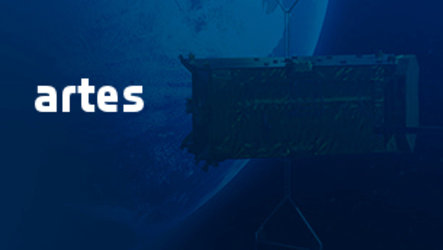Satellites improving lives in rural Africa
An ESA-supported project is showing how satcoms can help farmers, voters and educators in rural Africa.
The three elements of the Sway4edu project are helping to run elections, educate teachers and improve radio programming.
Satellite terminals provide Internet connectivity, with solar panels and batteries (where needed), laptops, tablets, a projector with screen, and loudspeakers.
Sway4edu is led by Openet Technologies, a small Italian company active in using satcoms for eGovernment services, working with Luxembourg’s SES and supported by ESA’s Advanced Research in Telecommunications Systems programme.
Radio programmes

The Rural Radios element is developing a satellite-assisted radio service to support farmers, workers and the population of the Democratic Republic of Congo on food security, rural and farmer subsistence, and climate change.
Through the online Openet eLearning platform broadcasters can take courses, developed with the UN’s Food and Agriculture Organisation, on delivering better radio programmes.
Feedback from broadcasters during pilot tests was highly positive: “Very good initiative to provide this tool for the use of rural radios in the bid for community development,” commented one.
Last September, Openet Technologies was contracted to provide Internet access for three years to 10 rural stations in DR Congo with the Federation de Radio de Proximité, which manages 400 such stations. By the end of this year, the contract could be extended to 100.
In October 2013, the company began providing a year of Internet and multicast connectivity for 26 rural radio stations in Mali. The contract was signed with the Fondation Hirondelle in Switzerland, which manages a group of 62 stations in Mali – the rest are expected to subscribe to the service by the end of this year. The multicast service is provided via the Astra-4A satellite.
Holding elections

Electoral eTraining is creating a core of local accredited trainers and experts in the Electoral Management Bodies of the Economic Community of Central African States to support elections.
Feedback from staff during pilot tests was very positive, as 40 completed the online courses for certification.
In August 2012, SES Broadband contracted with the Electoral Management Body of Burkina Faso to deliver connectivity and videoconferencing facilities, including installation and support for 40 provinces to support their December elections.
By mid-2013, the European Centre for Electoral Support, based in Belgium, had a contract to support Electoral eTraining in 14 African countries.
Education
Space4education is providing local teachers with interactive training and qualification via satellite. The system also opens up the Internet to local communities outside of school hours.

The ambitions go well beyond demonstrating that satellite can deliver the Internet everywhere: the aim is to assist local communities by raising the quality of teaching in difficult-to-reach schools.
Better teachers will lead to better students with wider options, and to empowered communities. The potential gains are huge.
Teachers and local stakeholders are very enthusiastic about the project and around 25 teachers have achieved online literacy certification.
The provision of Internet services following the end of the pilot activities is being discussed with several schools from that scheme.
All three elements of Sway4edu have something in common: they are building capacity to prepare for launching sustainable services.
“There is no doubt that the Sway4edu and the use of European technology and services have been highly successful, even in very remote and rural areas of Africa,” said ESA’s Davide Tomassini.















 Germany
Germany
 Austria
Austria
 Belgium
Belgium
 Denmark
Denmark
 Spain
Spain
 Estonia
Estonia
 Finland
Finland
 France
France
 Greece
Greece
 Hungary
Hungary
 Ireland
Ireland
 Italy
Italy
 Luxembourg
Luxembourg
 Norway
Norway
 The Netherlands
The Netherlands
 Poland
Poland
 Portugal
Portugal
 Czechia
Czechia
 Romania
Romania
 United Kingdom
United Kingdom
 Slovenia
Slovenia
 Sweden
Sweden
 Switzerland
Switzerland




























